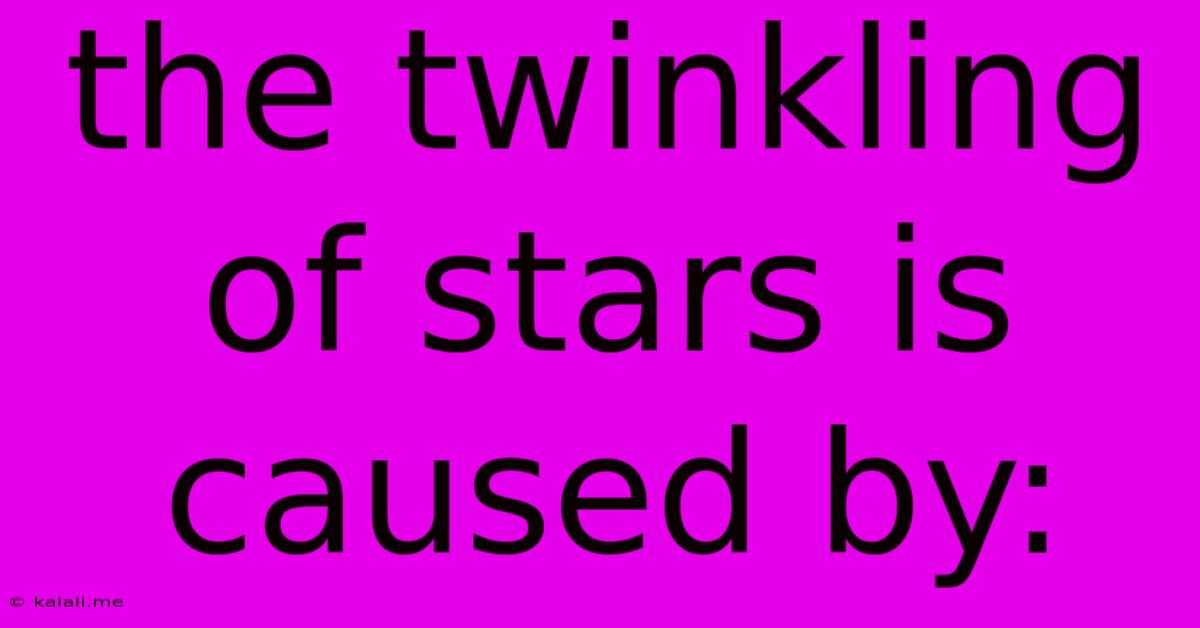The Twinkling Of Stars Is Caused By:
Kalali
Jun 14, 2025 · 3 min read

Table of Contents
The Twinkling of Stars: Atmospheric Distortion at Play
Have you ever looked up at the night sky and wondered why stars seem to twinkle? It's a question that has captivated humans for centuries, and the answer lies not in the stars themselves, but in the Earth's atmosphere. This article will explore the science behind this celestial phenomenon, explaining why stars twinkle while planets generally don't. We'll delve into the role of atmospheric refraction, turbulence, and how these factors create the shimmering effect we observe.
The twinkling of stars, also known as stellar scintillation, is primarily caused by atmospheric refraction. As starlight travels through the vast expanse of space, it eventually encounters Earth's atmosphere. This atmosphere isn't a uniform layer; it's a complex mixture of gases with varying densities and temperatures. These variations create pockets of air with different refractive indices. Refractive index refers to how much a medium bends light.
How Atmospheric Refraction Causes Twinkling
As starlight passes through these pockets of air, it gets bent or refracted. Because these pockets of air are constantly moving and changing due to atmospheric turbulence, the amount of refraction changes rapidly. This causes the apparent position of the star to shift slightly and rapidly, leading to the twinkling effect we perceive. Think of it like looking at a coin at the bottom of a rippling pool – the coin's position seems to shift and shimmer due to the water's movement. The same principle applies to starlight passing through our turbulent atmosphere.
Why Planets Don't Twinkle (as much)
While stars appear to twinkle, planets generally exhibit a steadier, less scintillating light. This difference is due to their apparent size in the night sky. Stars are so incredibly distant that they appear as mere points of light to our eyes. The atmospheric refraction affects this single point significantly, causing pronounced twinkling.
Planets, on the other hand, are much closer and therefore appear as tiny disks, rather than points. While atmospheric refraction still affects the light from a planet, the effect is averaged out across the entire disk. The twinkling is minimized because the light from various parts of the planetary disk is refracted differently, effectively cancelling out the scintillation to a large extent. You may still notice some slight shimmering, but it's far less dramatic than the twinkling of stars.
Other Factors Affecting Stellar Scintillation
Besides atmospheric refraction and turbulence, several other factors can influence the twinkling of stars:
- Altitude: Stars closer to the horizon twinkle more than those high in the sky because the starlight passes through a thicker layer of atmosphere.
- Temperature: Temperature variations in the atmosphere can significantly affect the refractive index and thus the degree of twinkling.
- Wavelength of light: Different wavelengths of light are refracted differently, potentially leading to variations in the observed color of a twinkling star.
- Atmospheric conditions: Clear, stable atmospheric conditions lead to less twinkling, while turbulent conditions enhance the effect.
Understanding the twinkling of stars provides a fascinating insight into the complexities of our atmosphere and its interaction with light from distant celestial objects. It's a beautiful reminder that the seemingly simple act of looking at the stars involves a complex interplay of physics and atmospheric dynamics.
Latest Posts
Latest Posts
-
How Much To Send Sat Scores
Jun 15, 2025
-
What Does Area Under Velocity Time Graph Represent
Jun 15, 2025
-
Centre Of Mass Of Equilateral Triangle
Jun 15, 2025
-
What Two Countries Share The Longest Border
Jun 15, 2025
-
Parts Of A Three Phase Motor
Jun 15, 2025
Related Post
Thank you for visiting our website which covers about The Twinkling Of Stars Is Caused By: . We hope the information provided has been useful to you. Feel free to contact us if you have any questions or need further assistance. See you next time and don't miss to bookmark.